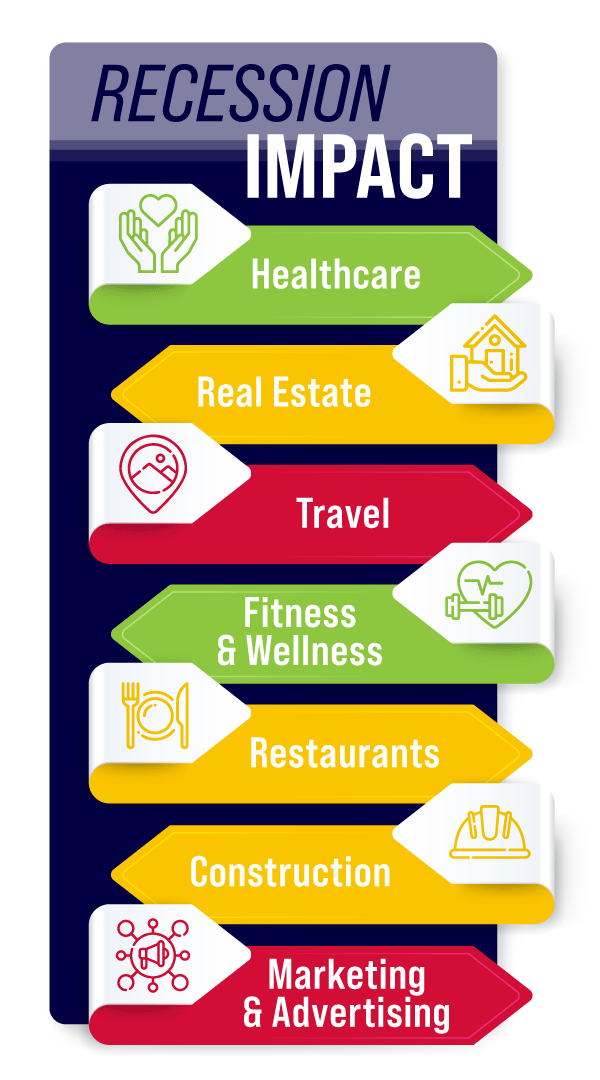
Articles
Is Your SMB Going to Take a Recession Hit? See Where Your Industry Falls.
July 27, 2022

Not that doom-and-gloom news headlines are anything new, but lately we seem to be seeing a lot of them predicting a recession.
Though we won’t officially be in a recession until we see two consecutive quarters of decreasing GDP, the unlikely combinations of inflation, a slowing housing market, and a massive labor shortage have many experts predicting that the bottom is about to fall out. Of course, some industries fare better than others during a recession, and even those that aren’t traditionally resilient can still survive. Here's a look at which industries will likely be hardest hit and which ones have an opportunity to thrive.

Healthcare
Conventional wisdom has long held that the healthcare industry is “recession proof,” since nobody’s cutting back on staying healthy — even when times are bad. And to some degree that’s true, as one recent study from the University of Illinois found that employment in the health care field actually goes up slightly as the overall rate of unemployment increases.
But not all economic markers work in the industry’s favor. According to an analysis by Healthcare Dive, as companies feel a pinch, one of the first places they look to cut costs is in employee healthcare. Similarly, as people lose jobs and the health insurance that comes with them, they’ll be less likely to seek treatment for non-essential issues. The analysis goes on to predict that providers — the area where most SMBs fall — will see larger losses as people visit the doctor less. But payers and pharmacy benefit managers shouldn’t see too much of a drop off as the insurance industry will likely hold strong.
Real estate
As we learned during the Great Recession of 2007-2008, the housing market is often the hardest hit by a recession. In fact, according to Econofact, eight of the last ten recessions have been caused by the housing market going bust, so if you’re in that particular industry times might be tough. If you need hard proof, in 2008 real estate transactions were down 45% from their all time peak in 2005, meaning a lot of high-flying realtors suddenly fell to the ground.
From an equity perspective, financial analysts like the Motley Fool say this recession shouldn’t be as bad as 2008’s for a number of reasons, chief among them the lingering demand for homes. That means even if prices go down, they won’t crash because there isn’t the abundance of inventory there was 14 years ago. Still, transactions may fall off, so for a real estate professional a dip may be bleak.
So yes, demand has slowed down a bit due to higher mortgage rates and a growing deficit in the housing supply, but economists believe a good number of buyers will still look for homes this year. SMB leaders in the real estate field can save some operational cash flow during recessionary times by streamlining their agent onboarding and training with learning modules that new agents can access in one comprehensive platform (cough, Trainual, cough). Instead of spending hours onboarding new agents and showing them the ropes, let some handy tech handle it for you while you focus on making those sales.
Travel
During the brief pandemic-era recession, perhaps no industry was hit harder than travel, as 2020 spending dropped 45% below 2019 levels, according to Hotel Management.net. Of course, that drop is easy to account for, as COVID-19 kept a lot of people home for reasons other than a sagging economy. To predict what might happen should we hit another recession, we can only look backwards to 2008, and how travel fared back then.
A report from the University of Massachusetts called the 2008 downturn’s effect on travel “disastrous.” Hotel occupancy rates were just a smidge over 50%, and with fewer people having any discretionary income, travel was one of the first things cut from the budget. There’s not much reason to think a 2023 recession would leave the travel industry faring any better. Not to be the bearers of bad news, but those in this industry may want to diversify.
Fitness and wellness
.gif)
You might think that when a person loses their job, one of the first things they’d cut from the budget is a gym membership. After all, running is free, right? But historically this has not been the case, as during the last recession the fitness industry actually saw minimal growth, according to Vigyr.com. As it turns out, as people have less money — and more time — focusing on fitness becomes more important. And as gym memberships are typically one of the more affordable ways of maintaining said fitness, it’s an easy expense to hold on to.
That said, members and clients may still question the value you’re offering versus, say, buying a set of fitness bands and sweating it out in the garage. So it’s important that you are able to express why coming to a gym or using a trainer is worth the money during tough times. People will still value fitness and wellness, but it’s up to you to explain why it’s worth the cost.
Restaurants
Restaurants, many of which already survive on minimal margins, might theoretically seem like the industry that a recession will batter hardest. But this isn’t necessarily the case. As inflation has driven grocery prices ever higher, some people may opt for quick-service or fast-casual meals as a purely economic decision. A burrito costing another dollar at Chipotle is a lot easier to stomach than a grocery bill that’s up $50.
While there isn’t a ton of research on the topic, one study found that limited-service restaurants actually do better during economic downturns as they have a larger labor pool and see increased demand. The flip side is that mid-range and expensive restaurants don’t fare nearly as well, suffering from what Restaurant Business Online calls the “trade-down” market. That is, people who might usually go for a sit down Italian dinner decide Pizza Hut is a pretty decent alternative when times are tough.
Construction
Back in 2008, construction took an absolute wallop, losing over 150K firms and 2.3M jobs between 2007 and 2013, according to Construction Connect. As demand for everything from homes to retail space plummets, so does the demand for new construction, and as such it’s as hard-hit (if not harder-hit) than real estate.
This time around might be slightly different, though, as a relative housing shortage may keep demand for new construction higher than in previous recessions. That’s not to say a construction firm shouldn’t take steps to brace for a downturn. But it may not be as catastrophic as before.
Marketing and advertising
Since consumer confidence, and consequently consumer spending, takes a nosedive during a recession, marketing and advertising are among the first expenditures to go. After all, what’s the point in advertising to people who are cutting their budgets to the bare essentials? So rather than hire an outside marketing, PR, or advertising firm, companies may opt to do it in-house, if at all.
Showing your return on investment will be crucial for marketing pros during a recession, and the good news is you have data to back you up. A number of studies have shown that firms who increase their advertising and marketing during a recession do far better than those who cut down, dating all the way back to the Great Depression of the 1930s. So if you’re able to properly convince your client that marketing is an essential expense, you may be able to weather the storm.
Similar Blog Posts










